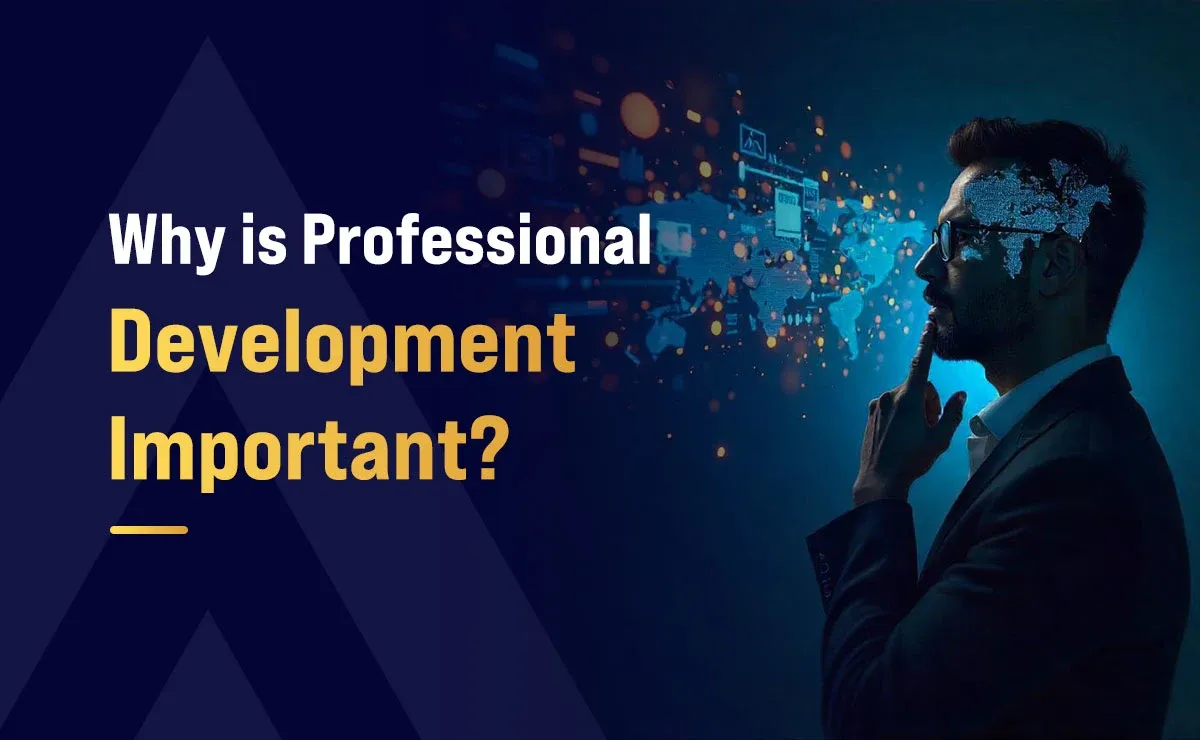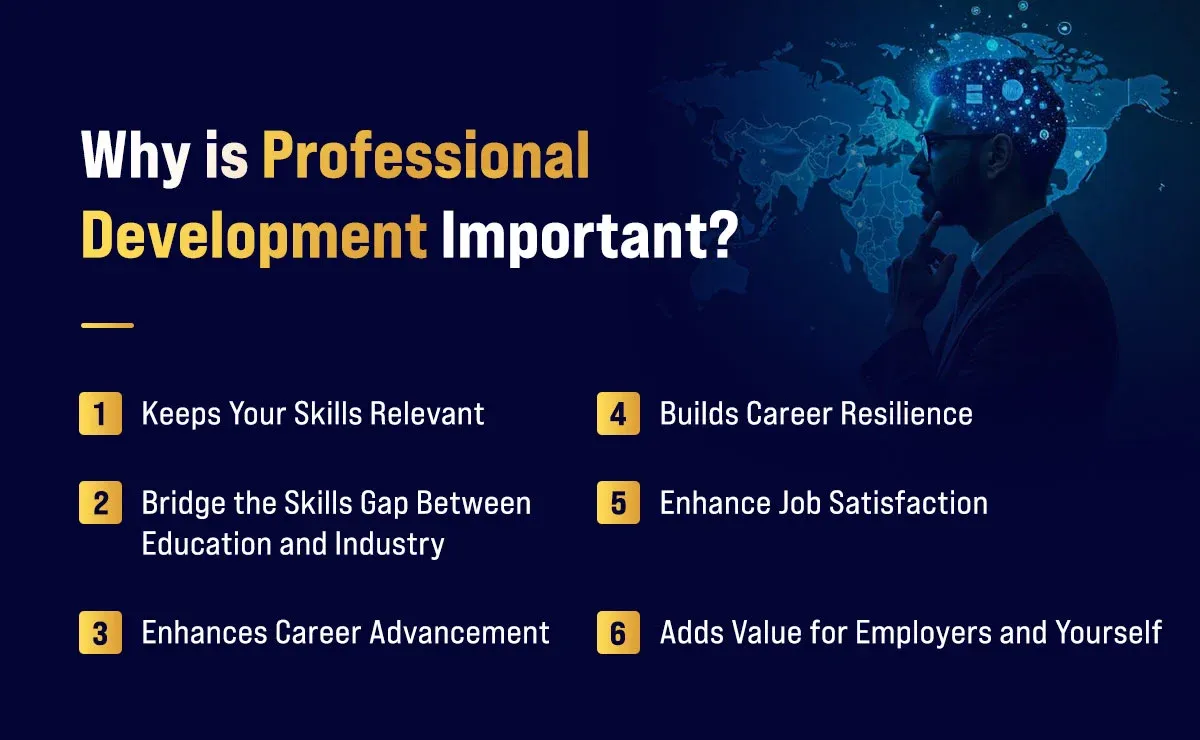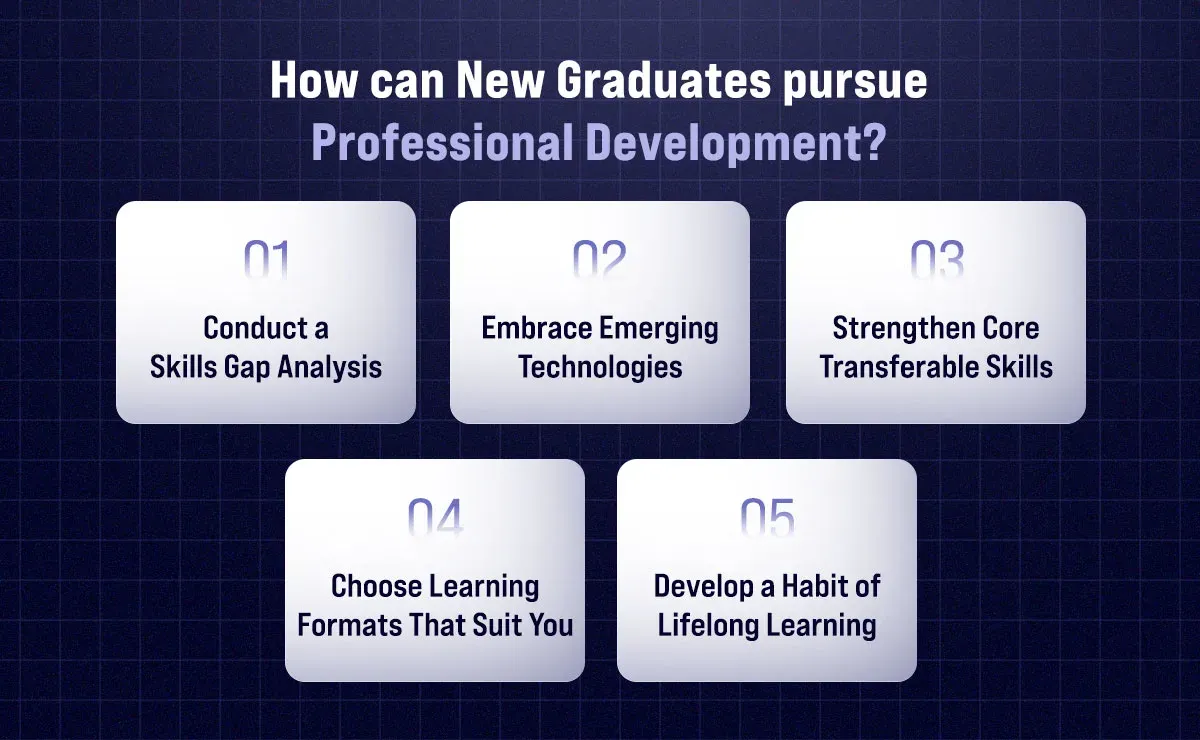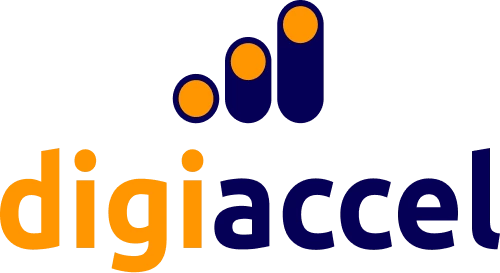Why is Professional Development Important?

India's job market in 2025 stands at a pivotal juncture, characterized by a complex interplay of rising unemployment, persistent skill gaps, and the transformative impact of artificial intelligence (AI). Despite proactive government initiatives and a growing recognition of learning and development (L&D) by employers, significant systemic issues persist.
Furthermore, while the benefits of professional development are quantifiable, a sizable portion of the workforce remains untrained, often due to a disconnect between corporate training models, educational inadequacy, and employee priorities.
Hence, this article delves into what professional development really means, highlighting its critical role in addressing evolving challenges and actionable steps to pursue it effectively.
What Is Professional Development?
Professional development is the deliberate and continuous process of acquiring new knowledge, skills, and competencies that enhance performance and advance your career trajectory. It is a multifaceted approach that includes formal education, specialized training programs, certifications, on-the-job training, and independent learning designed to bridge the gap between your current capabilities and future career requirements.
The scope of professional development extends to both hard skills (technical knowledge) and soft skills (communication, leadership, emotional intelligence). It also recognizes the importance of digital literacy, staying current on industry trends, and seizing opportunities that prepare you for new roles.
Why Employers Value Continuous Learning?
Understanding how employers view professional development can help you position yourself advantageously in the job market. Companies are increasingly recognizing the strategic value of learning and development, with 58.5% allocating dedicated budgets to training their employees in FY25.
Employee upskilling yields compelling results, including a 63% higher retention rate, as well as increased productivity and profitability. The Skill India initiative, led by the Ministry of Skill Development and Entrepreneurship and carried out through the NSDC, has already provided millions of people with job-ready skills. However, to maximize this impact, corporate L&D must align with both these national programs and employee priorities.
Why is Professional Development Important?
Professional development matters because it is the bridge between where you are today and where tomorrow’s jobs and your future career lie. In India, fewer than half of graduates (just 42.6%) meet industry-required skill standards. This “skill relevance crisis” means that without continual learning, even a good degree may leave you unprepared for real-world roles.
The following are six key reasons why professional development is a strategic imperative for professionals at every stage of their careers:

Keeps Your Skills Relevant
The integration of emerging technologies such as artificial intelligence, automation, and data analytics across industries is changing the nature of work too. So continuous professional development enables individuals to align themselves with current industry standards, ensuring that their skills remain relevant, practical, and in demand.
Bridge the Skills Gap Between Education and Industry
One of the most pressing challenges that India's workforce is facing today is the disconnect between academic training and practical, job-ready skills. Around 80% of Indian employers report a "skill relevance crisis" where jobs and job seekers are available, but they cannot connect because of mismatched capabilities. This is why continuous professional development is key in addressing this skill gap.
Enhances Career Advancement
Today, candidates who demonstrate proactive learning and upskilling are more likely to secure promotions, new roles, and attractive job offers. Employers increasingly value tangible and demonstrable skills over academic credentials alone. Independently focusing on professional development provides proof of competence, initiative, and adaptability to your employers.
Builds Career Resilience
Economic shifts and industry disruptions continuously bring forth new trends, competencies, and skill requirements. Hence, professional development fosters learning agility, equipping individuals to adapt to change rather than be disrupted by it. Rather than being limited by outdated knowledge, professionals who continually invest in themselves remain flexible and future-ready, regardless of changes in their job function or sector.
Enhance Job Satisfaction
Beyond career advancement, professional development enhances an individual’s sense of accomplishment, motivation, and confidence. Engaging in new learning experiences fosters a mindset of continuous improvement, which can lead to greater satisfaction in one’s current role. PwC found that 74% of workers want to acquire new skills in their training and are more likely to remain in the company that invests in their development.
Adds Value for Employers and Yourself
Both the employee and the company gain from professional growth. Organizations that promote continuous learning cultivate a more skilled, motivated, and forward-thinking team. And for professionals, acquiring new skills and industry knowledge enhances personal value, making them an indispensable asset within their team or industry.
The Cost of Not Upskilling
Failing to invest in continuous learning carries significant downsides:
- Skill Obsolescence: As AI, automation, and digital tools reshape roles, traditional skills and competencies lose precedence. Most job openings now expect at least basic digital literacy or industry specific skills relevant today.
- Limited Career Mobility: Employers increasingly hire based on demonstrable skills today, rather than degrees alone. Without upskilling, employees struggle to qualify for promotions, cross-functional moves, or emerging roles.
- Lower Earning Potential: Without in-demand skills, individuals lose out on better-paying job opportunities and career advancement. The India Skills Report shows that professionals who complete recognized upskilling programs command noticeably higher salaries than their non-upskilled peers.
- Job Insecurity: As 83% of Indian professionals fear automation or technology might replace them. Not upskilling feeds into this anxiety, leading to a less confident and less adaptable workforce.
- Decreased Engagement: A lack of clear growth pathways and investment in skills directly erodes employee satisfaction. Professionals deprived of development opportunities are significantly more likely to feel disengaged and seek opportunities elsewhere.
How can New Graduates pursue Professional Development?
For recent graduates entering the workforce, professional development should be approached with intention, clarity, and adaptability. Students must build a foundation for continuous growth from the start of their career. Below are some strategic recommendations for developing your skills as a professional.

Conduct a Skills Gap Analysis
Begin by evaluating your current skill set compared to the expectations of employers in your chosen field. To pinpoint the most sought-after skills, consult job postings, sector analyses, and feedback from professionals who have successfully entered the field. Based on this assessment, create a focused learning plan to bridge the identified gaps by prioritizing areas that are both high-demand and aligned with your career aspirations.
Embrace Emerging Technologies
Regardless of your academic discipline, gaining familiarity with foundational digital skills is always beneficial. Technologies such as artificial intelligence, data analytics, and digital-first tools are no longer confined to a specific role; they are now integral to decision-making and innovation across finance, marketing, healthcare, education, and more.
Strengthen Core Transferable Skills
In addition to technical knowledge, employers consistently seek professionals who demonstrate effective communication, critical thinking, collaboration, and leadership capabilities. These transferable skills not only enhance your immediate performance but also prepare you for future managerial or strategic roles. Enroll in specialized courses, participate in group projects, and actively seek feedback to develop these competencies.
Choose Learning Formats That Suit You
Consider the learning formats that work best for your lifestyle and preferences. Leverage microlearning modules, interactive simulations, and gamified platforms that align with your learning style. Many top-tier platforms now offer structured courses in short, focused formats, which is ideal for integrating into busy schedules and increasing knowledge retention.
Develop a Habit of Lifelong Learning
Treat learning as a long-term investment in your career rather than a one-time task. Set aside dedicated time each week for professional development—whether that means completing online courses, reading industry journals, engaging with professional communities, or working on side projects that build relevant skills. Consistency in learning not only enhances your capabilities but also fosters a proactive mindset that employers deeply value.
FAQs
Q1. What Are the 5 Ps of Professional Development?
Ans: The 5 Ps of professional development are:
- Purpose: Clarify your career goals and what you aim to achieve.
- Planning: Create a structured roadmap to reach your goals.
- Practice: Apply what you learn through real-world experience.
- Performance: Measure progress and refine your approach.
- Progression: Continue evolving through lifelong learning.
Q2. What is an example of a professional development activity?
Ans: An example of a professional development activity is completing a specialized certification course in data analytics to improve your job prospects and stay competitive in the evolving job market.
Summing Up
In essence, professional development is not just a tool for career growth—it is your competitive edge in a dynamic work environment. Whether you are a new graduate figuring out your early career or a young professional shifting to emerging trends, time spent in continuous development is the most reliable way to future-proof your own career.
It adds measurable value to employers by driving productivity, innovation, and retention. Hence, by embracing a structured approach—grounded in self-assessment, skill-building, and consistent learning—you not only align yourself with industry needs but also demonstrate the adaptability and initiative that today’s employers are actively seeking.

